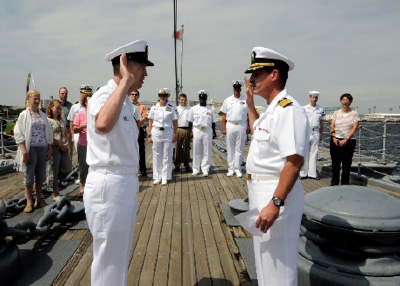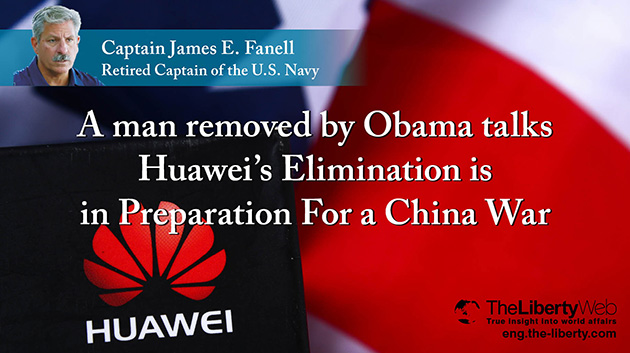A man removed by Obama talks
Huawei's Elimination is in Preparation For a China War
Olya Detry / Shutterstock.com

He graduated from San Diego State University, received his M.A. from the University of Hawaii and was a National Security Affairs Fellow at the Hoover Institution at Stanford University. His last assignment in the U.S. Navy was as the Director of Intelligence and Information Operations for the U.S. Pacific Fleet where he warned of the People’s Republic of China’s (PRC) military expansionism and aggression, but was removed by the Obama administration who feared creating tensions with China. He is currently a Government Fellow at the Geneva Centre for Security Policy in Switzerland.
— During your former years of active duty as a Navy Captain, you warned of the People’s Republic of China’s (PRC) military expansionism and aggression , but you were removed by the Obama administration who feared creating tensions with China. In 2017, you pointed out that the U.S. Navy needed at least 355 ships to counter the PRC’s military expansion.
Fanell: Exactly. However, things have escalated since my initial warnings. Now, I expect that by 2030, China will most likely have a total of 550 ships and submarines. As such, in my opinion, a 355 ships U.S. Navy is not enough to counter the PLA Navy.
When I talk about this, I receive criticism that “it is not quantity but quality that matters.” Yet, I submit that the Chinese Navy not only has more quantity, but also has good quality. I have been aboard their warships several times over the past twenty years and the last time was in 2018 onboard the PLA Navy Frigate Binzhou when it was in port Kiel, Germany. And today, I can assure you that the PLA Navy has more long range anti-ship cruise missiles (ASCM) than the fleets of both Japan and the United States. The PLA Navy’s ASCMs fly at supersonic speeds and skim the wave-tops and are longer range than their Japanese and American counterparts. Therefore, Japan and America must build navy ships that can fight and win wars at sea.
What we learnt through World War II is the importance of naval warfare. This became more important during the Cold War with U.S.S.R., where American aircraft carriers and submarines constantly sailed near Russia and confronting the Soviet Union’s fleets around the world. However, after the Soviet Union collapsed in the late 1980s, the U.S. shifted its attention to the Middle East and the “Global War on Terrorism” for the last 30 years. This shifted the U.S. Navy’s role to supporting “joint forces” fighting land wars in the Middle East, and placing naval warfare in a distant position in the Pentagon’s prioritization of resource allocation and strategic thinking.
With the last 20 years of PRC naval modernization, it is time that we should put our focus back onto naval warfare and acquire ships that match China’s Navy in both quality and quantity.
We Can Instantaneously Detect Movement of Chinese Army
— The U.S. government is working with other nations to eliminate Huawei and other Chinese companies from their 5G national networks.
Fanell: The U.S. war fighting capability is greatly aided by its ability to command and control (C2) its forces. The ability to have C2 over our forces requires providing them with a common operating picture (COP) of the battlespace. The U.S. military has invested heavily in having the ability to do network-centric warfare that allows our ships and aircraft to communicate secure data (voice, video, datalinks) to each other and to allow one platform (ship, sub, or aircraft) to provide targeting data to another platform that can engage (shoot) an enemy platform.
Let’s say that the tip of my fingers equates to a ship, submarine, or an aircraft. With one finger, I can only cover a little area, but if you have all the fingers spread out, you can cover a much larger area of surveillance where each finger (ship, submarine, or aircraft) can communicate with each other, and provide targeting data to engage the enemy. The power of Network Centric Warfare is covering more territory and enabling every warfighting platform to be used to engage the adversary.
For instance, one finger can tell another finger, “I see what you need to do. You can shoot the adversary now.” Since information is shared between all the fingers, they can quickly recognize how they should move. This is our strength.
Today Network Centric Warfare is called Distributed Maritime Operations in the U.S. Navy and the vision will connect both manned and unmanned naval platforms together to present a more lethal threat to the Chinese Navy, as well as making the Chinese Navy’s targeting job much harder.
However, this kind of Distributed Maritime Operations can only occur if the networks are secure. That can only be assured between our allies if we know that we’re using the same technology that has not been infiltrated by the PRC’s cyber forces which would come in the form of Huawei software and hardware that is pushed by their 5G networks.
You’ve seen the Trump administration be very strict on not allowing Huawei into our networks. That is because we can make no compromise in the area of information security. We will not compromise. We need more people to understand our thought process on this issue, as it will ultimately be for the benefit of the people of Japan and our other allies.
— There has been movement to add Japan to the “Five Eyes,” the network of information collection and sharing between five nations including the U.S., the U.K. and Canada.
Fanell: If Japan is part of that network, it makes it easier for America to share information back and forth between the other four nations. When I was the Director of Intelligence and Information Operations at the U.S. Pacific Fleet Headquarters in Hawaii, I was one of the earliest and strongest advocates of adding Japan to the Five Eyes network and I believe that adding Japan to Five Eyes will help the U.S. and Japan be effective in defending themselves and to bring safety to the Asia Pacific region.
While I am very pleased to see this reporting about adding Japan to the Five Eyes agreement, I must say that it has taken so long because there are concerns in America about Japan’s reliability in the [data] security arena. This is important for our alliance to be deepened and I am glad to see Japan demonstrating that they are taking security issues seriously.
Japan has, in my opinion, worked hard to convince Washington that they take security very seriously. I cannot emphasize enough of how important it is for the Japanese government to continue to demonstrate that they are trustworthy. The more our two military forces can share tactical intelligence in real-time, the more effective we will be in defending against Chinese military attacks.
U.S. Democratic Party Will Lose to China
— If Democrat Joe Biden, the former vice president, becomes the next president, how will U.S.-China strategy change?
Fanell: The Trump administration has set aside much of the defense budget to address the China’s military aggression and threats. The current U.S. administration has increased U.S. military operations in the region to deter China. I believe that if Mr. Biden is elected, his administration, led by foreign policy advisors that were in the Obama Administration, will be devoted to undoing everything this current administration has done. Like during the Obama administration, these same foreign policy advisors will say things that sound good to your ears (like the so-called “rebalance to the Pacific”), but will be followed by no action, and thus allow China to control more and more.
Biden has repeatedly made statements that “China’s not a threat” throughout his years in the government, and he is surrounding himself with the very people who have espoused the philosophy of engagement over the last 40 years. These people are angry with the Trump administration’s policy of standing up for America and pushing back against the PRC.
These former Obama officials and “engagers” have even falsely accused the Trump administration of not having a China Strategy.
This is ironic because the Trump administration has done more to define a China Strategy than any other U.S. administration in the last 40 years. For instance, the Trump Administration has taken a “whole of government” approach to developing a China Strategy and has published a new National Security Strategy, a new National Defense Strategy, a Indo-Pacific Strategy report, and the White House’s National Security Council published a new policy paper that called for a strong U.S. approach to PRC.
However, in the case that Mr. Biden is elected, I want Japan to pro-actively approach U.S. about the PRC, so the U.S. doesn’t go back on its China policy.
Finally, regarding Australia, I would also strongly recommend that Japan be prepared to make another offer to sell submarines to the Australian government. I say this because it is possible that Australia may have to rethink its decision to go with a French contract and because of the very high regard I have for Japan’s technology and capabilities in the undersea domain. Also, I know that a contract for submarines between Australia and Japan would not just be about hardware, but could also include training and exercises which could be coordinated with the U.S. Navy.
Finally, I would recommend that Japan continue to strengthen the QUAD coordination between Japan, U.S., India, and Australia. Working together to build a comprehensive multinational defense framework across the Indo-Pacific is vitally important.
To avoid war, we need to be well prepared.
The U.S. and Japan should take the lead in protecting Asia’s peace.




















